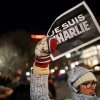
9/11 is a date which is etched into the minds of all as a scar in living memory. Now the French have another date to remember: 1/7.
Last Wednesday, two heavily armed Islamists1 burst into the offices of the French satirical magazine Charlie Hebdo and killed eleven employees in cold blood after the magazine portrayed the prophet Muhammad in offensive ways. Commentators have endlessly discussed such killings and the events that followed.
The initial reaction to the killings at Charlie Hebdo was that it represented an attack on one of the foundation stones of liberal democracy — freedom of speech. Seemingly every statesman, politician, editor, journalist and tweeter defiantly united under the banner “Je suis Charlie” (trans. I am Charlie). Millions in Paris and elsewhere in France marched with world leaders to send a clear message to Islamic fundamentalists that they would not allow themselves to be cowed into silence.
Over the last week, however, we have witnessed some dissension in the ranks and the realization by some that the moral high ground is neither as elevated nor steady as it first seemed. It turns out that many people abhor the killing of journalists AND the offensive images which Charlie Hebdo published.
Along with everyone else, they believe that the makers of Charlie Hebdo did nothing to deserve being killed. On the other hand, they do not believe that the slain journalists ought to be exalted as moral heroes since their magazine served to raise the heat under a pot that was already boiling. The phrase “Je ne suis pas Charlie” (trans. I am not Charlie) has emerged as an expression of this moral unease.
After the immediate one-sided reaction that was dominated by the assertion of the freedom of expression, more concerns and matters of conscience are finding their way into the debate. Here are a few that deserve a mention:
- The British newspaper The Guardian asserted in an editorial that the right to offend is implicit in the right to freedom of expression. Satire has been present in European and French culture for centuries and even played a key role in the ousting of monarchical power during the French Revolution. The argument goes that curbing the right to offend weakens a democracy and paves the way for tyranny and the abuse of political power.
- Even if we retain the right to offend, what constitutes a legitimate target for satire? It has become clear that the cartoons of Charlie Hebdo have caused major offense to a French Muslim community that was already feeling marginalized. A Jesuit friend who for decades has worked with marginalized communities on both sides of the Irish border noted that satire is most effective when it takes aim at the powerful — and most destructive when it ridicules the weak. Or as another liberal Muslim commentator has put it, satire should “punch up.”
- Talk is cheap and it’s easy to be Charlie when you’re not in the direct line of fire. Irvine Welsh, the author of the cult novel Trainspotting, decried the outbreak of pseudo-solidarity with those who lost their lives. He observed that many will defend Charlie Hebdo’s right to publish offensive cartoons but wouldn’t dream of publishing them themselves for fear of the reprisals.
- The far right has been on the rise in the UK and France for the last decade. The centrist parties will want to ensure that Nigel Farage of UKIP and Marine La Pen of Le Front National don’t score too many political points as a result of the recent events in Paris. It will soon become apparent that when politicians stand together they don’t stand together for long. It’s standing room only on the high moral ground, and a little cramped at that.
- There will be calls to clamp down on immigration into Europe. The timing couldn’t be worse for the estimated 9 million Syrian refugees who have fled their homes since the outbreak of civil war there. This probably won’t achieve much. Firstly, no border control will prevent the spread of extremist ideologies because they can spread like wildfire on the internet. Secondly, Muslims and non-Muslims are perfectly capable of living side by side if the conditions are favorable to both. So when a pot is boiling over, don’t take out the potatoes. Just turn down the heat. (Yes, that is an original metaphor, and yes, I’m Irish).
- It might be of interest to some readers that I have not noticed any instances of this latest spate of violence being used to justify a relaxation of gun laws. To be honest, this scenario didn’t even enter my mind until it struck me that TJP has a large US readership. Europeans for the most part believe that individual citizens do not need to own guns and society would not be a safer place if they had them.
Charlie Hebdo has just published 5 million copies of their latest edition featuring the prophet Muhammad on the front cover with a sign saying Je Suis Charlie. This concerns me because in the current climate it could be perceived as an inflammatory act, and more violence could ensue.
The French republic was founded on three values: Liberté, Égalité and Fraternité. But, as is often the case with values, when one is vociferously promoted it can come at the expense of another. Any married couple will tell you that a common sense compromise is frequently the only way forward: preservation of the relationship takes precedence over individual desires. My hunch is that at the moment Liberté is taking up too much space in the bed, and Fraternité has landed with a thud on the floor.